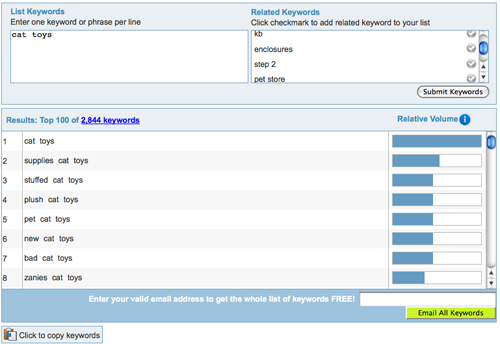Keyword research is a pain in the butt, but someone’s gotta do it! And, let’s be honest, if you’re a search engine marketer there really isn’t anything more important than keywords. So, you’re essentially doomed to a life of tedious research and spreadsheets. Sorry.
How many of you get judged solely on the movement of one vanity search term? How many of you know that search term doesn’t convert well, but your boss really wants the world to know you rank for it? Meanwhile, you still have to get the conversions! So, you spend your day fighting with developers over small on-site changes that could make a world of difference, but they’re giving you the run around. Frustrating, huh?
On the bright side, you aren’t alone and there’s a cute cat picture to help you get through hump day!
Back to keywords. We know keyword research is boring and we know you have to do it, so the question is really just a matter of how. Everyone has their tried and true method. Back in the day, I was a Wordtracker gal. It was what I was trained on and most companies already had an account with them. Sure, I dabbled with Wordze, SEO Book’s Keyword Suggestion Tool and Keyword Discovery, but I always ended up back in bed with Wordtracker. Unfortunately, it doesn’t cut it for major decisions (though I do love their Keyword Questions tool), so I had to look elsewhere, too. Now my keyword research method is a hodge podge of tools, search engines themselves, analytics and the force.
Tools
I already mentioned Wordtracker, Wordze, SEO Book and Keyword Discovery, so let’s talk about industry newbie, Wordstream. They offer comprehensive keyword management products and, as a nice brand builder, just launched a free keyword research tool. It’s very easy to use and returns robust results at the same time. I almost wish they’d make it look more complicated so the product felt like the heavy hitters it belongs to.

I’m also not a fan of the “related keywords” suggestions, which returned results like [condos], [dog food], [kb], [mattel], [hasbro] and [little people] with my [cat toys] search! There were some related keywords like [scratching], [perch], [enclosures] and [cat] that made sense, but at least half did not (keep in mind, I’ve never been impressed by Wordtracker’s related results as well, but kept using it). I will say that with more long tail searches, like one I did for [martin fender stratocaster], I received much more relevant suggestions. I’m also not a fan of the way the negative filtering feature was implemented. It isn’t glaringly apparent to a first time user and I wish I could see those terms dropped into a separate bucket just in case I want to add them back later. Still, it’s a good feature if you know to click on the keywords in the list.
Things I love – the super simple “Click to copy keywords” button at the bottom of the page after you’ve finalized your list. It’s ridiculously fast! And, I also like that I can email the full list, which is sent as a zip and unzips into a tidy little CSV file with terms and relative volume. Most importantly, it’s FREE, so it’s by far the best free option and rivals the paid. I wish there was more transparency about where they were pulling the results from, but I did like the full lists I was pulling for different keywords, so the secret sauce is working for now.
Search Engines
The search engines have made major headway in communicating keyword suggestions to users and us. Here are just some of the incredible tools that help us better understand user intent, which in turn means a better understanding of what we can/should target:
- Google Adwords Keyword Tool
- Google Webmaster Central’s Top Search Queries
- Google Trends
- Google Insights for Search
- Google Search Options
- Bing Search Suggestions
- Yahoo Search Assist
- Twitter Trending Topics and Advanced Search Queries
Check out Wil Reynold’s post on targeting long tails for a nice look at how to take advantage of some of those tools. I like his philosophy, it’s a lot like ours. Whatever problem you’re solving, there are several paths you can take to get there, but the data should guide you in a statistically significant and positively trending way.
Analytics
That brings me to your analytics. We need to know what the search engines are telling us about users, but more importantly, we need to know what the site offers! Even though Google says a lot of cat owners want to make homemade toys, you’re in the business of selling manufactured toys. You could do some creative things to target that term, but it probably shouldn’t appear in the top level categories of your site, because it probably isn’t going to convert well. You have to turn to analytics to prove that.
A recent client came to us with a “well-optimized” site. They just wanted link development and social media work. They ranked well for their major search phrases, so we proceeded. Several months in, it’s become apparent that those terms really don’t define the client. They’re heading in a new direction and the keywords don’t support their goals. We took a look at their analytics and sure enough, they rank well, but those terms drive little to no converting traffic. Oh boy, it’s overhaul time!
The Force
After years of keyword research, there’s a certain component to it that I can’t explain to muggles (yeah, I just got Star Wars and Harry Potter in this post and Lisa’s cringing). Seriously though, after staring at keywords for years and working in certain industries, you pick up on trends, user intent, what works on your site, etc. So, no matter what the tools, search engines and analytics are saying, sometimes your gut has to take a leap. What works for the competition may not work for you and you have to embrace the differences or work towards fixing them.

Pictures by:

